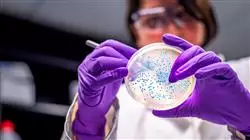University certificate
The world's largest faculty of pharmacy”
Introduction to the Program
By enrolling in this program, you will be empowering yourself to prevent the rise of antibiotic resistance”

In humans, infections are caused by microorganisms, including bacteria, viruses, fungi and parasites. Although there are millions of these microbes in the world, only a small number are capable of causing an infectious reaction. In addition, over the years, these pathogens have developed new ways to evade the drugs designed to fight them, increasing the lethal risk of infections.
For this reason, the program of this Postgraduate diploma has been designed to focus specifically on antivirals, antifungals, antiparasitics and the development of antibiotic resistance. Therefore, students will obtain specialized knowledge in each of them, starting with the general aspects and use of antivirals, which are used for diseases such as hepatitis, influenza and respiratory viruses.
On the other hand, antifungals are substances used to inhibit and destroy the harmful effects of fungi that cause infections in the human body. The program will classify them according to their chemical structure and mechanisms of action (local and systemic). In this way, the antimicrobial spectrum and the therapeutic use of amphotericin B and local antifungals will be known.
This group also includes antiparasitics, used to treat parasitosis or infectious diseases caused by parasites. As in the previous modules, the student will learn the general aspects of these drugs and their classification. Also taking into account the new advances and recommendations of the WHO for its use and regulation.
For all these reasons, the program will help graduating students to broaden their employment options, allowing them to access a market that demands experts willing to study and deploy new antibiotics. They will also be prepared to conduct independent research focused on the development of new drugs.
Understand how antibiotic resistance develops to develop new drugs”
This Postgraduate diploma in Antivirals, Antimycotics, Antiparasitics and the Development of Antibiotic Resistance contains the most complete and up-to-date scientific program on the market. The most important features include:
- The development of case studies presented by experts focused on advances in antibiotic therapy and antibiotic resistance
- The graphic, schematic, and practical contents with which they are created, provide scientific and practical information on the disciplines that are essential for professional practice
- Practical exercises where self-assessment can be used to improve learning
- Its special emphasis on innovative methodologies
- Theoretical lessons, questions to the expert, debate forums on controversial topics, and individual reflection assignments
- Content that is accessible from any fixed or portable device with an Internet connection
Enroll in this program and you can get the knowledge you need to grow professionally”
The program’s teaching staff includes professionals from the sector who contribute their work experience to this educational program, as well as renowned specialists from leading societies and prestigious universities.
Its multimedia content, developed with the latest educational technology, will provide the professional with situated and contextual learning, i.e., a simulated environment that will provide an immersion education programmed to learn in real situations.
The design of this program focuses on Problem-Based Learning, by means of which the professional must try to solve the different professional practice situations that are presented throughout the academic course. For this purpose, the student will be assisted by an innovative interactive video system created by renowned experts.
The world needs new drugs to combat the most dangerous infections. Would you like to take part in new pharmacological studies?"

There is no better time than now to start a new professional approach. Enroll now in this Postgraduate diploma and access to new job opportunities"
Why study at TECH?
TECH is the world’s largest online university. With an impressive catalog of more than 14,000 university programs available in 11 languages, it is positioned as a leader in employability, with a 99% job placement rate. In addition, it relies on an enormous faculty of more than 6,000 professors of the highest international renown.

Study at the world's largest online university and guarantee your professional success. The future starts at TECH”
The world’s best online university according to FORBES
The prestigious Forbes magazine, specialized in business and finance, has highlighted TECH as “the world's best online university” This is what they have recently stated in an article in their digital edition in which they echo the success story of this institution, “thanks to the academic offer it provides, the selection of its teaching staff, and an innovative learning method aimed at educating the professionals of the future”
A revolutionary study method, a cutting-edge faculty and a practical focus: the key to TECH's success.
The most complete study plans on the university scene
TECH offers the most complete study plans on the university scene, with syllabuses that cover fundamental concepts and, at the same time, the main scientific advances in their specific scientific areas. In addition, these programs are continuously being updated to guarantee students the academic vanguard and the most in-demand professional skills. In this way, the university's qualifications provide its graduates with a significant advantage to propel their careers to success.
TECH offers the most comprehensive and intensive study plans on the current university scene.
A world-class teaching staff
TECH's teaching staff is made up of more than 6,000 professors with the highest international recognition. Professors, researchers and top executives of multinational companies, including Isaiah Covington, performance coach of the Boston Celtics; Magda Romanska, principal investigator at Harvard MetaLAB; Ignacio Wistumba, chairman of the department of translational molecular pathology at MD Anderson Cancer Center; and D.W. Pine, creative director of TIME magazine, among others.
Internationally renowned experts, specialized in different branches of Health, Technology, Communication and Business, form part of the TECH faculty.
A unique learning method
TECH is the first university to use Relearning in all its programs. It is the best online learning methodology, accredited with international teaching quality certifications, provided by prestigious educational agencies. In addition, this disruptive educational model is complemented with the “Case Method”, thereby setting up a unique online teaching strategy. Innovative teaching resources are also implemented, including detailed videos, infographics and interactive summaries.
TECH combines Relearning and the Case Method in all its university programs to guarantee excellent theoretical and practical learning, studying whenever and wherever you want.
The world's largest online university
TECH is the world’s largest online university. We are the largest educational institution, with the best and widest online educational catalog, one hundred percent online and covering the vast majority of areas of knowledge. We offer a large selection of our own degrees and accredited online undergraduate and postgraduate degrees. In total, more than 14,000 university degrees, in eleven different languages, make us the largest educational largest in the world.
TECH has the world's most extensive catalog of academic and official programs, available in more than 11 languages.
Google Premier Partner
The American technology giant has awarded TECH the Google Google Premier Partner badge. This award, which is only available to 3% of the world's companies, highlights the efficient, flexible and tailored experience that this university provides to students. The recognition as a Google Premier Partner not only accredits the maximum rigor, performance and investment in TECH's digital infrastructures, but also places this university as one of the world's leading technology companies.
Google has positioned TECH in the top 3% of the world's most important technology companies by awarding it its Google Premier Partner badge.
The official online university of the NBA
TECH is the official online university of the NBA. Thanks to our agreement with the biggest league in basketball, we offer our students exclusive university programs, as well as a wide variety of educational resources focused on the business of the league and other areas of the sports industry. Each program is made up of a uniquely designed syllabus and features exceptional guest hosts: professionals with a distinguished sports background who will offer their expertise on the most relevant topics.
TECH has been selected by the NBA, the world's top basketball league, as its official online university.
The top-rated university by its students
Students have positioned TECH as the world's top-rated university on the main review websites, with a highest rating of 4.9 out of 5, obtained from more than 1,000 reviews. These results consolidate TECH as the benchmark university institution at an international level, reflecting the excellence and positive impact of its educational model.” reflecting the excellence and positive impact of its educational model.”
TECH is the world’s top-rated university by its students.
Leaders in employability
TECH has managed to become the leading university in employability. 99% of its students obtain jobs in the academic field they have studied, within one year of completing any of the university's programs. A similar number achieve immediate career enhancement. All this thanks to a study methodology that bases its effectiveness on the acquisition of practical skills, which are absolutely necessary for professional development.
99% of TECH graduates find a job within a year of completing their studies.
Postgraduate Diploma in Antivirals, Antimycotics, Antiparasitics and the Development of Antibiotic Resistance
Antivirals, antifungals and antiparasitics are drugs designed to treat infections caused by viruses, fungi and parasites, respectively. How these drugs work depends on the nature of the infection in question, but each is known to attack different aspects of the infectious agent.
Antivirals are drugs specifically designed to treat viral infections. They are designed to inhibit the replication of viruses and thus prevent the progression of the infection. Some antivirals are able to reduce the duration and severity of symptoms of viral infections, while others can prevent infection.
Antifungal drugs are medications designed to treat fungal infections. These drugs can fight a broad spectrum of fungal infections and are available in different forms, including pills, gels and even shampoos. Some types of antifungals act topically, while others are administered orally or intravenously.
Antifungals are medications designed to treat parasitic infections. The type of antiparasitic used depends on the type of parasite involved. Some dewormers are able to directly attack the parasites, which can kill them or prevent them from reproducing. Others work to strengthen the host's immune system to fight the infection.
Antibiotic resistance is the phenomenon by which bacteria, fungi, viruses and parasites become resistant to the drugs that used to fight them. This can occur through different mechanisms, in some cases favored by the excessive or inappropriate use of antibiotics and other drugs. Once resistance occurs, treatment can become ineffective, which can lead to infections becoming worse and much more difficult to treat.
The goal of this academic program is to provide students with advanced knowledge on the design, development, evaluation and use of antiviral, antifungal and antiparasitic drugs and the challenges related to the development of antimicrobial resistance.







